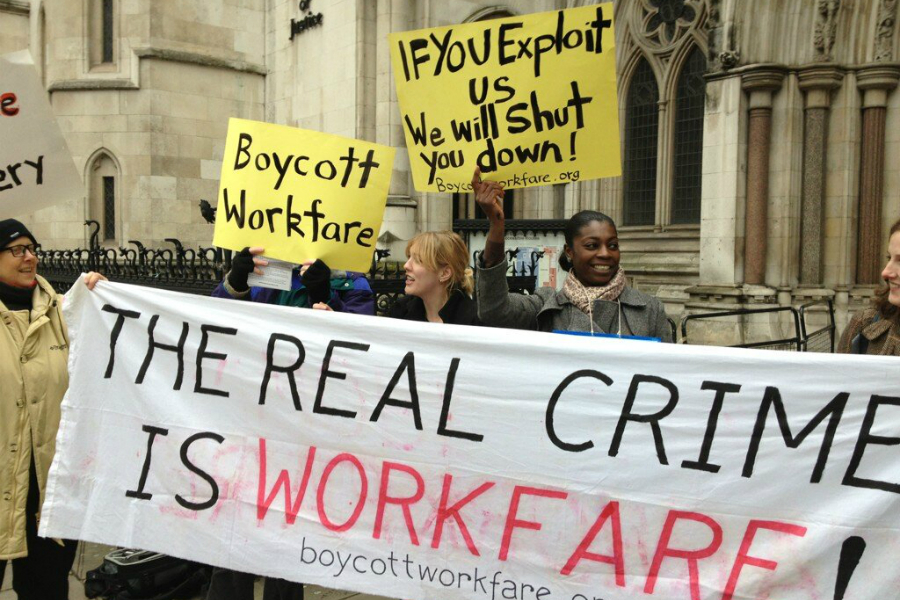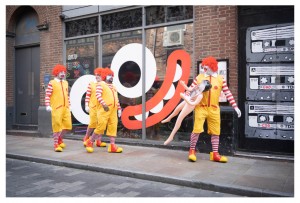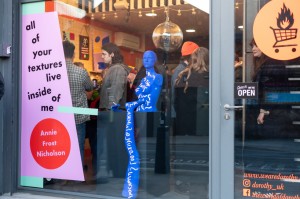Troublemaker:
An Artist on Jobseeker’s

In case you didn’t know, getting a foothold in the arts sector is hard. But that’s just for starters, explains C James Fagan…
I’ve been struggling with this for days now. By which I mean this article based around my experiences of claiming Jobseeker’s Allowance while simultaneously attempting to forge a career in the arts.
Maybe it’s something in my attitude; firstly, I attempt to keep the two separate, and secondly, I never consider myself unemployed, as for the last five years there hasn’t been a time when I haven’t volunteered for the career I want to work in. From galleries to festivals to biennials, and even starting my own projects, I’ve been putting in the time. I’ve also been employed over this period but in temporary or seasonal positions.
Of course, man cannot live by travel expenses alone; this is why I claim Jobseeker’s, as a means of support. Just enough to get by. I believe this to be a common experience for many people in the arts and beyond.
So what is my experience? Why have I struggled to write this article? One element is that I have attempted to be fair, rather than start an ‘us-and-them’-style rant. Another is this sense of separation, the sense that claiming Jobseeker’s and pursuing an artistic career run in parallel.
It all starts at the beginning, when you first make your claim knowing that this amorphous thing called a Jobcentre isn’t geared up for your type of career, nor do you expect it to be. You make an arrangement in which you de-prioritise your career ambitions, look for something until something else comes along.
At this point I should note that I’m not looking for a job at the top, but at entry level. That’s why the volunteering. So what is the Jobcentre response? Reactions vary from one advisor to another (you’ll see more than one advisor over the course of your jobseeking); some will be positive, recognising that you’re being proactive; others will see the arts as a hobby.
For a while you can coast along with no real problems. You can involve yourself in as many art projects as you wish, creating the most ambitious exhibitions ever seen, but if you’re not paid for it, well … that means nothing. The Jobcentre is not the Holy Grail for finding paid employment. I remember, perhaps naively, asking if exhibition proposals counted towards job search. It doesn’t. I don’t know why it doesn’t count.
Ultimately I keep pretty quiet about any artistic endeavour as the general response isn’t a ‘good for you’, it’s often a ‘you will have to give it up for any job’. I often don’t mention any project as I feel that the advisers suspect I’m trying to worm my way out of my responsibilities: to be looking for/be available for work.
Eventually if you’re there long enough you’ll be sent to a third party organisation, where the same issues exist and you come to feel more like an anomaly not fitting to any system: not theirs, the one of McJobs. You quickly begin to doubt your suitability for your chosen field.
Your CV, which you crammed with voluntary work experience, seems largely ignored. Is this how everyone views your CV? As the work of a hobbyist? Maybe your degree is putting off potential employers?

You question if that time spent working for organisations and projects which might offer the smallest hint of a foot in the door has been for nothing, as now sending said CV to any position at all (regardless of sector), is more important. Your value here is as a statistic, especially if it can be used to prove the success of whatever Government programme is in vogue.
If you’re unlucky to find that the only jobs you had over the work programme period have been Xmas jobs, you might find yourself out the other end and in the hands of another third party organisation.
Despite having three ‘quasi-jobs’ – that is unpaid positions which I take as seriously as any paid employment – you’re told that the best thing for you is a Mandatory Work Activity (where individuals must work unpaid or risk their benefits) to enforce the disciplines of employment.
At this point I don’t think anyone is bothering to look at my CV, and it feels like the assumption is that you’re the sole fault. If someone were to ask, I’m sure I could provide positive references that prove I’m worthy of employment. But go through it you must, no matter how unsuitable, because it’s mandatory. Do it for your benefit even if any real benefit is unclear.
I’m not afraid of hard work, so I’m not moaning about that, but there’s something amiss here and there’s a lot of taxpayer’s money being spent on a half-arsed system. For my original MWA placement I was sent to a factory to smash window frames. I’ve managed to change it to voluntary work at a charity shop.
It seems puzzling to send someone already volunteering to do more voluntary work. I looked up the guidance given to JSA advisors and was angered to discover that there is a rule that states the client shouldn’t be sent to a MWA if they are already attending paid or voluntary work (No.17). Maybe some time and money could have been saved by adjustment of my current voluntary position, but this option was never considered. It’s also difficult to raise these issues with an advisor for fear of being branded a troublemaker, or worse, ‘unwilling to work’.
You might ask yourself, surely there should be MWA programmes or the like for those working in the arts, that big art organisations could offer such placements? Based on experience and anecdotal evidence, organisations that have signed up for such schemes have found themselves with a number of unsuitable candidates, leading many to withdraw.
It seems that the current system, meant to aid people into work isn’t working, not properly. It appears to operate on getting the first available person into the first available placement with little regard to their suitably. This doesn’t just to apply to people attempting to work in the arts, it applies to all. What is the sense of sending someone who wishes to be a nurse to break rocks? Where is the benefit – to anybody – in that?
Ultimately I believe that it’s the system that is at fault. It might be a positive move for others chasing jobs in the arts if more arts organisations where able to offer skill-gaining programmes, or that volunteering for galleries, museums, festivals etc. were recognised as more than hobbies.
Until these failures are addressed then the system will continue to fail people – no matter where they want to work. I understand that checks have to be in place, to ensure that we are doing what we say we’re doing and the system isn’t being abused. Equally though, I’m tired of feeling that I’m being judged by the standards of those taking advantage of the system. I imagine, for example, that all MPs don’t wish to be thought of as selfish, money-hungry, careerists.
Being on Jobseekers is, as I’m sure many of you are aware, isn’t some kind of slacker’s paradise. It’s an experience that can leave you feeling alienated from, well, both sides. Carrying a dirty secret wherever you go, keeping the ‘truth’ of working in the arts from one and the reality of signing on from the other.
For the moment I’m stuck in the system unless I find employment, or have the courage to go freelance, which seems to be a common route for many in the arts despite finding it incredibly difficult to support themselves through that method.
I will continue to exist in these weird inbetween grey-spaces until something better comes along.
C James Fagan
Main image courtesy boycottworkfare.org, a UK-wide campaign to end forced unpaid work for people who receive welfare
Is your experience uncannily similar to Chris’s or something different entirely? We’d love you to let us know via the comments.





